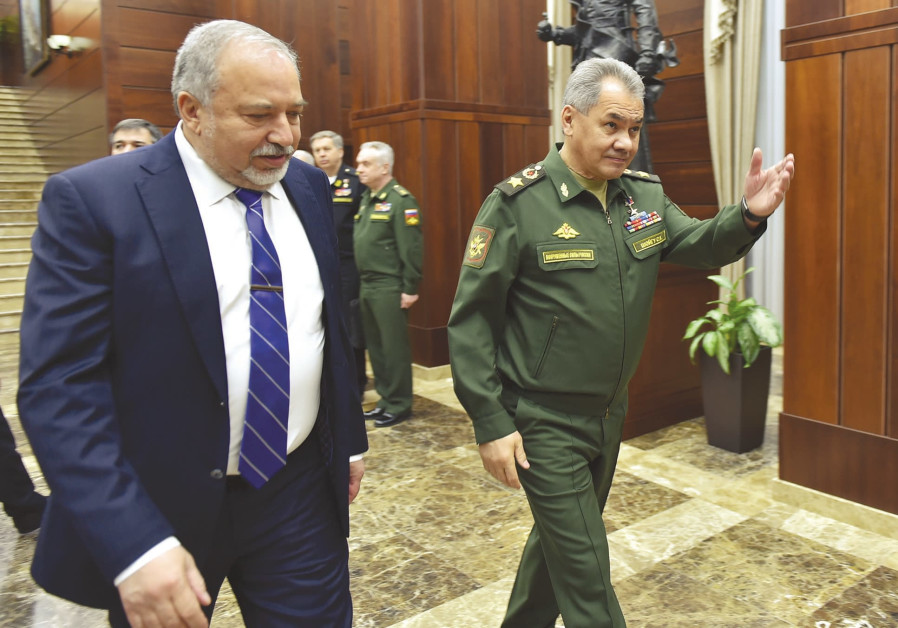The defense minister’s meeting was followed by a telephone conversation between Prime Minister Benjamin Netanyahu and Russian President Vladimir Putin.

Iran and its proxy forces, such as Hezbollah, are preparing to withdraw from southern Syria, the Syrian Observatory for Human Rights reported on Thursday, as part of a Russian-backed plan to return Syrian government forces to the country’s border with both Israel and Jordan.
According to information posted on its website, the observatory said there were “preparations by the Iranian forces and forces of the Lebanese Hezbollah and militias operating under the command of the Iranian forces to withdraw from both [southern] provinces [Daraa and Quneitra] and from the lines near the border with the occupied Syrian Golan.”
It issued its report after Defense Minister Avigdor Liberman made a quick trip to Moscow to meet for an hour and a half with his Russian counterpart Sergei Shoigu. He returned to Israel shortly afterward.
The meeting was followed by a telephone conversation between Prime Minister Benjamin Netanyahu and Russian President Vladimir Putin.
Prior to Liberman’s visit, Russian Foreign Minister Sergei Lavrov called on non-Syrian forces to withdraw from the country’s southern border as soon as possible.
Israel wants to see a deal that initially forces Iran to withdraw 70 to 80 kilometers from the border and eventually from all of Syria. The complex deal would also involve agreements with the US and Jordan, which also borders Syria.
“Israel appreciates Russia’s understanding of our security needs, especially with regard to the situation on our northern border,” Liberman said after his meeting with Shoigu.
“It is important to continue the dialogue and to keep an open line between the IDF and the Russian army,” he said.
The Syrian opposition newspaper Zaman al-Wassul reported on Thursday that a Syrian Army commander in recent days had prevented the use of aircraft hangars, which until now had been used to store ammunition by Iranian militias.
According to the report, “The decision followed the recent Israeli attacks.”
It was taken as an indication of the regime’s decision to demand that Iran close shop on the southern border as a first step in a broader policy of booting Iranian forces completely from Syria, according to the source in the Syrian Army.
The observatory said: “Jordanian-American-Russian consultations are taking place about several points concerning the stay of the rebel and Islamic factions operating in Daraa, in exchange for handing over their medium and heavy weapons, and the entry of Russian military police.”
It added that “any force or members belonging to the Iranian forces, the Lebanese Hezbollah and their affiliated militia will not enter, and the border points will be handed over to the regime’s police and its border guards, and also the area will be managed by local councils that will be formed from residents of the area.”
Shoigu told Liberman, “It is necessary to discuss everything about the situation on the border, in the southern de-escalation zone, where we have an agreement with Jordan and the US.”
He added that the situation in Syria was improving “following the almost bloodless reconciliation in the Eastern Ghouta, Homs as well as after the liberation of Yarmouk, the southern suburb of Damascus, from ISIS.”
He said he was sorry that Liberman had not visited Russia with Netanyahu to attend the May 9 Victory Parade and invited him to come to next year’s parade.
The Moscow meeting was also attended by the head of the Military Intelligence Directorate, Maj.-Gen. Tamir Heiman, and the head of the Defense Ministry’s diplomatic-security division, Zohar Palti.
Meanwhile, in Brussels, EU foreign policy chief Federica Mogherini met with a delegation from the Syrian opposition, headed by the secretary-general of the National Coalition for Syrian Revolutionary and Opposition Forces, Naser al-Hariri.
He said there were now up to 100,000 Iranian or Iran-affiliated fighters in the country.
“The role of Iran is getting bigger and bigger, at the expense of our people,” Hariri said. “So we are supporting any international mechanism that could limit the influence of Iran in the region in general, and in our country in particular.”
But concern in Washington grew on Thursday that Moscow’s real aim, in calling for Iran to exit southern Syria, is really to pressure the Trump administration to leave the country as well – a move that would leave Russia as the sole power player on the ground.
Assad called on Trump to remove his forces in an interview with Russian media earlier in the day. “The Americans should leave. Somehow, they’re going to leave,” he said.
And the Russian agreement with Israel allegedly includes a call by Moscow for a US withdrawal in step with an Iranian exit. Trump has already said he hopes to pull US troops out of Syria within a matter of months after the complete defeat of ISIS in Syria’s eastern provinces.
Israeli officials view a US withdrawal with trepidation, as they consider the American presence there to be a buffer, preventing Iranian forces in Iraq and Syria from joining hands. Absent US forces, Iran will have accomplished its goal of forming a contiguous land bridge across the Middle East to the Mediterranean, the Israelis warn.
As reported by The Jerusalem Post
